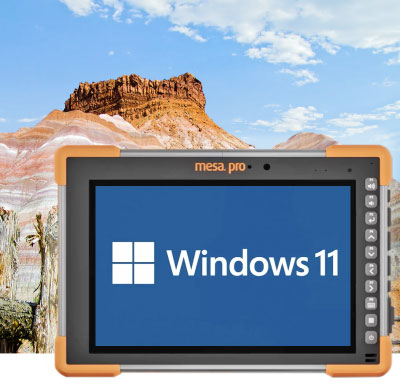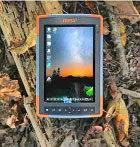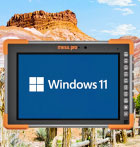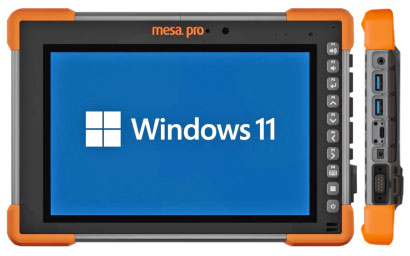Juniper Mesa Pro
Entering the big league with fully rugged, high-performance 10.1-inch Windows 11 tablet
(by Conrad H. Blickenstorfer)
Juniper Systems officially introduced the Mesa Pro Rugged Tablet on August 17, 2022. It's Juniper's first entry into the important 10-inch rugged tablet segment, and also the one with the largest display in the company's history. How did this come about?

Located in Logan, a small town in picturesque northern Utah, Juniper Systems is no stranger to steadily and reliably marching to the beat of its own drummer. And quite successfully so.
Take the original Mesa, for example. They called it a "rugged notepad" and it had a 5.7-inch screen. That was in 2010 when handhelds still had 3.5-inch screens and smartphones weren't much larger. It's probably fair to say that even Juniper didn't know just how far ahead of the game they were with their super-sized rugged handheld. Back then it defied conventional classification. But Juniper was right — customers wanted to see more on their phones and handheld computers, and display sizes kept growing.
But then Microsoft discontinued Windows Mobile, the small operating system that ran on the Mesa and had dominated vertical market handhelds for many years. Again, Juniper took the lead by making full Windows available on the larger and more powerful Mesa 2, which had a 7-inch display, and then the Mesa 3 that had the same form factor as its predecessor, but came in versions for Windows as well as for Android.
And now the Mesa Pro is here, another unique rugged device — a true tablet — with an even larger screen, 10.1 inches, which is pretty much the standard in the fully rugged Windows-based tablet segment. Here's a table that shows how the new Mesa Pro compares to the still available Mesa 3:
|
Juniper Systems Mesa 3 vs. Mesa Pro
|
|
Model
|
Mesa 3
|
Mesa Pro
|
|
|

|

|
|
Introduced
|
2019
|
2022
|
|
OS:
|
Windows 10
|
Windows 11
|
|
Processor
|
Intel Pentium N4200
|
Intel 11th
|
|
RAM
|
8GB
|
8 or 16GB
|
|
Mass storage
|
128GB or 256GB
|
128GB or 256GB
|
|
Expansion slots
|
MicroSDHC Card
|
MicroSDXC Card
|
|
Display
|
7.0"/1280 x 800 (216 ppi)
|
10.1"/1920 x 1200 (224 ppi)
|
|
Total pixels
|
1.024 million
|
2.304 million
|
|
Digitizer
|
Projected capacitive
|
Projected capacitive
|
|
Battery Life
|
12 to 15 hrs.
|
NA
|
|
Keypad
|
nav pad + functions
|
nav pad + functions
|
|
Size (inches)
|
5.4 x 8.5 x 1.4
|
11.2 x 7.7 x 1.2
|
|
Weight (lbs.)
|
2.0
|
3.4
|
|
Sealing
|
IP68 (dustproof and totally waterproof)
|
IP68 (dustproof and totally waterproof)
|
|
Temp. range
|
-4° to 122°F
|
-4° to 122°F
|
|
Camera
|
2mp front + 8mp rear
|
2mp front + 13mp rear
|
|
USB Type A
|
1 x USB 3.0
|
1 x USB 3.1
|
|
USB Type C
|
None
|
1 x USB 3.1
|
|
Serial
|
optional
|
optional
|
|
Bluetooth
|
v4.0 Class 1.5 (100+ ft)
|
v5.1 Class 1.5 (100+ ft)
|
|
WiFi
|
802.11a/b/g/n
|
802.11a/b/g/n/ac
|
|
WWAN
|
4G LTE
|
4G LTE
|
|
Scanning
|
Integrated (scan models)
|
Integrated (scan models)
|
With the new Mesa Pro, Juniper is clearly making available an entirely new product line to its customers. While the Mesa 3 brought both Windows 10 and Android to rugged handhelds, its primary portrait orientation identified was an evolution of earlier, smaller field devices. The new Mesa Pro, on the other hand, is a full-fledged Windows tablet. It's Juniper's entry into the hotly contested market of fully rugged, high-performance 10-inch Windows tablets.
Below you can see what the Mesa Pro looks like from the front and the right side where all the ports are. It's a clean, functional tablet design with Juniper's trademark orange bumpers, one that's easy to hold, carry around and use.

While the original Mesa — being in size and function somewhere between a traditional handheld and a small tablet — was a bit difficult to classify, the Mesa Pro is clearly a rugged tablet computer. It's designed for Microsoft Windows and to be used in traditional landscape mode, labeling and physical button arrangement and all.
We haven't had a Mesa Pro in our lab for testing yet, but here is our preliminary assessment.
The Mesa Pro Rugged Tablet — an initial overview
The Juniper Mesa Pro is a full, mainstream Windows tablet. It is still unmistakably a Juniper Systems product and continues Juniper's tradition of ruggedness and sensible, practical technology. But the Mesa Pro reaches beyond Juniper's traditional markets. This tablet directly competes with Tier One rugged tablet makers such as Getac and Panasonic, as well as rugged tablets from Durabook, DT Research, RuggON, Dell and others. Here's a look at the specs that matter:
- First and foremost, the Mesa Pro is powerful, way more powerful than the Mesa 3. It comes with the same high-performance "Tiger Lake" 11th Generation Intel Core i5 and i7 processors mainstream high-performance rugged tablets use. That means plenty enough punch to handle even the most complex field applications. And if all-out performance isn't needed for an application, the MesaPro is also available with a lower cost Intel 11th generation Celeron chip.
- With Intel 11th generation processors come Intel's powerful Intel Iris Xe graphics as well as PCIe Gen 4, which stands for the Peripheral Component Interconnect Express expansion bus specification. The former makes for graphics performance that comes close to and sometimes exceeds that of dedicated discrete graphics chips. The latter is used for extremely fast mass storage data transfer.
- At this point we're not sure to what extent Juniper is exploiting the Intel 11th gen processor technology. For example, the Mesa Pro comes standard with 128GB or 256GB SATA-based storage, but the spec sheet also mentions 512GB and 1TB of PCIe NVMe storage, which would provide much faster data transfer than SATA storage.
- Likewise, the Mesa Pro specs don't mention Thunderbolt 4, a technology that is available via Intel 11th generation Core processors. Inherently, Thunderbolt 4 uses the USB-C connector (which the Mesa Pro has) to support charging upstream and downstream charging and the USB 4 standard with very fast data transfer (up to 40 Gbit/s), as well as the ability to drive dual 4K displays.
- Another tantalizing prospect is the Intel 11th generation Core processors' ability to be configured and optimized usage modes that can be used to tune on-battery performance and battery life.
- As is, the Mesa Pro comes with two USB 3.1 Type A ports, a USB Type C port, a separate 3.5mm audio jack, and an optional RS3232 DB9 serial port for legacy peripherals..
- For ingress protection, with the Mesa Pro Juniper aims for (the spec says "planned") a perfect IP68. That's as high as it gets. The first number stands for protection against solids. 6 means the unit is totally protected against the finest dust. The second number is for the degree of protection from liquids. That scale goes from 0 (no protection) to 8 (totally immune to water, even indefinite immersion). As is, the Mesa 3 is the only fully rugged tablet we know of with a certified IP68 rating, and if the Mesa Pro gets there too, that would exceed the competition.
- The Mesa Pro has a wide operating temperature range of -4 to 122 degrees Fahrenheit. While not quite as extreme as that of the company's Archer 3 rugged handheld (which can go as low as -22 degrees Fahrenheit and as high as 140 degrees), this makes the Mesa Pro suitable for deployment in just about any environmental setting, even freezers.
- As far as the ever-popular drop testing goes, the Mesa Pro survives multiple drops from four feet onto concrete. That's again a bit less than the super-rugged Archer 3 handheld, but remarkable considering that the Mesa Pro is a much larger, heavier tablet. The specs actual list "1.2 to 1.5 meter", so five feet drops may be possible.
- The Mesa Pro's 10.1-inch screen provides much more display real estate than the Mesa 3's 7-inch screen. And 10.1 inches is what the established rugged tablet industry offers. In that tablet segment, full 1920 x 1200 pixel resolution is expected, and Juniper delivers that. 224 pixels per inch make for a very sharp display. As for display luminance, Juniper specs claim "best in class sunlight viewability," but no nits rating yet.
- Anytime you offer high performance and a big, bright screen in the field, battery life becomes an issue. Juniper handles that with a dual battery design that makes batteries hot-swappable and offers up to 86.4 watt-hours, which is a lot. No official battery life in the specs (yet), but Juniper says they last for "long days on the job."
- As is Juniper's custom, the Mesa Pro is available in different versions. Core i7, Core i5, and Celeron-based models come with different amounts ot RAM and mass storage, and there are also special barcode models with integrated 1D/2D imager. And Juniper can also accommodate all sorts of other customizations, configurations and integrations.
What does the Mesa Pro mean in the larger scheme of things? In essence that the fully rugged high-performance tablet market has a new contender that's meeting the established rugged tablet competition head-on. And also that Juniper's traditional customers now can look to Juniper for their full-size rugged tablet needs.
Is the new Mesa Pro a surprise? Not at all. Juniper has been hinting at the new tablet for quite some time and also has shown it at trade shows. And the company has always had an unerring sense of what to preserve of the past and present, and what to adopt and adapt for an ever-changing emerging future. Conrad H. Blickenstorfer, August 2022
|
|
 Specifications Juniper Mesa Pro
Specifications Juniper Mesa Pro
|
|
Form-factor
|
Rugged tablet computer
|
|
Added/changed
|
Added 08/2022
|
CPU
|
Intel 11th Generation Core i5 (standard)
Intel 11th Generation i7 Core i7
Intel 11th Generation Celeron
|
OS
|
Microsoft Windows 11 Enterprise
Microsoft Windows 11 Pro (opt.)
|
Standard/Max RAM
|
16GB LPDDR4X (i5 and i7 models)
8GB LPDDR4X (Celeron models)
|
Disk/drive
|
256GB SATA (standard on i7)
128GB SATA (i5 and Celeron)
opt. 512GB/1TB PCIe NVMe
|
Card slots
|
User-accessible MicroSD Card up to 1TB
|
Display type
|
Optically binded high-visibility backlit TFT with Dragontrail glass
|
Display size/res
|
10.1"/1920 x 1200 (224 ppi)
|
Digitizer/pens
|
Projected capacitive multi-touch, glove and wet-capable, narrow-tip stylus
|
Keyboard/keys
|
LED-backlit directional keys, Volume up/down, 8 programmable function keys, Windows, power, enter
|
Navigation
|
touch, stylus, directional keys
|
Housing
|
ABS plastic with overmolded bumpers
|
Operating Temp
|
-4° to 122°F (-20° to 50°C)
|
Sealing
|
IP68
|
Altitude
|
MIL-STD-810H Method 500.5 Low Pressure
|
Shock
|
Multiple 4-foot drop to concrete
|
Humidity
|
MIL-STD-810H Method 507.5
|
Vibration
|
MIL-STD-810H Method 514.6
|
Sand and dust
|
MIL-STD-810H Method 510.5
|
Intrinsic Safety
|
Optional Class I, II, III, Division 2, Groups A, B, C, D, F, G
|
Size (WxHxD)
|
11.2 x 7.7 x 1.2 inches (285 x 195 x 31 mm)
|
Weight
|
3.4 pounds (1.76 kg) depending on battery configuration
|
Power
|
Removable 43.2 watt-hour Li-Ion ("8-10 hrs."), optional 43.2 watt-hour Li-Ion
|
Camera
|
Front: 2mp, rear: 13mp with LED illumination
|
Sensors
|
Ambient light, compass, accelerometer, gyroscope
|
Scanning (Barcode models)
|
Optional integrated 1D/2D imager
|
Interface
|
1 x USB 3.1 Type A, 1 x USB Type C, 3.5mm audio, optional RS232 DB9 serial, mics, speaker
|
Wireless
|
Dual-band 802.11a/b/g/n/ac WiFi, Bluetooth v5.1 Class 1.5, BLE support, 4G LTE multi-carrier capable, optional FirstNet Band 14 mobile broadband
|
Certifications
|
US: FCC Class B; Canada: ICES-003 Class B, ISED; EU and EFTA: CE marking; Australia: ACMA; Safety: IEC/EN 62368-1; RoHS 2, RoHS 3, REACH, SCIP, other
|
Product page
|
Mesa Pro product page
|
Spec sheet
|
Mesa Pro spec sheet (PDF)
|
Contact
|
www.junipersys.com or call 1.435.753.1881
|
|
|

|
|






